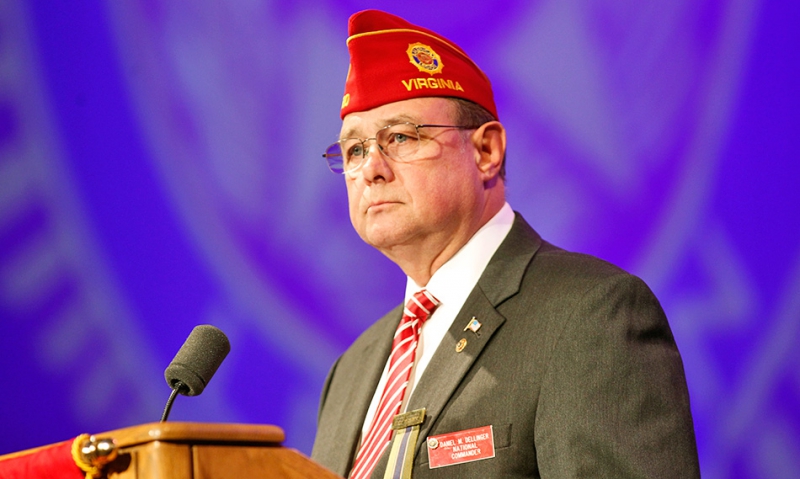
Dellinger: VA still a system worth saving
When word first broke of possible deaths at Department of Veterans Affairs facilities because of secret “waiting lists” for patients needing care, as well as the manipulation of data by VA employees, The American Legion and National Commander Daniel Dellinger acted quickly. In a press conference in May, Dellinger called for resignations from VA Secretary Eric Shinseki and his under secretaries of health and benefits.
“The American Legion was the first and only major veterans organization to call for a leadership change at the top of VA,” Dellinger told thousands of delegates to the Legion’s 96th Annual National Convention in Charlotte, N.C., on Aug. 26. “We were criticized by some for acting rashly or prematurely. 'Wait for the investigations to be completed,’ people in and outside the government told us. Other veterans groups would not join us in our call for change. But then report after report came out completely confirming our worst suspicions and reinforcing our stance: The system is broken.
“Now, we still believe it is a system worth saving, and we have confidence that the new VA secretary – now armed with fresh legislation backed by The American Legion – will help fix what was once the best health care system anywhere."
During the national commander’s annual report to the convention, Dellinger said that his organization has two simple demands of VA: access and accountability.
“Veterans have earned the right to quality health care and should be seen in a timely manner,” Dellinger said. “When VA managers and employees fail to provide this access, they need to fix the problem or seek employment elsewhere. In cases of fraud or other crimes, they need to be prosecuted.”
But Dellinger said access doesn’t only apply to receiving care, but also to earned benefits. “No veteran should have to wait six months, nine months or, in some cases, several years to have a claim processed and settled,” he said.
Dellinger said the Legion’s veterans town hall meetings and Veterans Crisis Command Centers staged across the country have helped thousands of veterans get face to face with VA employees to schedule health care and apply for benefits.
But the Legion hasn’t been lax in its other missions, Dellinger said. He noted that the Legion remains one of the loudest voices opposed to sequestration. “We spend too little on defense as it is, and sequestration is scheduled to return in fiscal year 2016,” he said. “Friends, we are funding our military at pre-World War II levels, as a group of mad terrorists run rampant throughout the Middle East, beheading innocent men, women and children – including Americans.
“And it’s not just our enemies that can do us harm. Last year, seven U.S. Marines were killed during a live fire exercise at Hawthorne Army Depot in Nevada. While the official investigation cited human error as the cause, it also determined that the mortar section had not conducted 'appropriate preparatory training.' Ladies and gentlemen, military officials from the Secretary of Defense on down have repeatedly warned us that training and readiness would suffer because of sequestration.”
Dellinger said that it is “immoral to send improperly trained or ill-equipped troops into harm’s way. Those who serve have taken an oath to sacrifice their lives if necessary but it should not be because their leaders in Washington can’t pass a sufficient budget. And if we can spend trillions to fight wars and rebuild nations, we can spend billions to take care of those who did the heavy lifting.”
Shifting to the fact that future military personnel will see benefit reductions, Dellinger made a succinct point: “I have one simple message to anybody who believes that military and veterans benefits are too generous – the recruiter will see you now.”
Dellinger said Legion programs like Operation Comfort Warriors, the Family Support Network, Temporary Financial Assistance, the National Emergency Fund, the Legacy Scholarship and a partnership with Soldier’s Wish are making a real impact on thousands of veterans. More than 850 veterans found work through Legion hiring fairs last year.
There would be a huge gap for America’s veterans and military families if the Legion ceased to exist, Dellinger said. “Who would serve as role models, instilling traditional American values into the next generation?” he asked. “Who would advocate for the next generation of troops, just as we have for veterans since World War I? Who would be awarding National Emergency Fund grants, organizing community blood drives and raising money for scholarships?
“This is why membership is so important. If the Legion wasn’t here to defend the Four Pillars that have not only made our organization great but have also made America great, who will?”
New members are out there, Dellinger said. “We just need to sign them up,” he said. “We have a solid five-year membership plan developed to help us accomplish our goals. It includes strategies such as creating brand awareness, communication, training and leadership development, post development and revitalization, recruiting and retention.
“Nobody will join The American Legion out of pity. We must maintain a positive outlook. It’s up to all of us to give them a reason to join.”
Before he took a look back at his year, Dellinger took a few minutes to remember two giants in the organization. The national commander honored longtime National Executive Committee Jerry Hedrick – a North Carolina Legionnaire who passed away unexpectedly one day earlier – and Past National Commander Richard Pedro, who died last winter after a lengthy illness.
“(Hedrick’s) sudden departure has shocked his many, many friends on this stage, on your national staff, and, in fact, through the entire American Legion family,” Dellinger said. “He was a leader in every sense of the term.
Dellinger said Pedro, who served as Department of New York adjutant for decades, was a “mentor and friend to so many national commanders and leaders in our organization. But Dick was approachable to all.”
